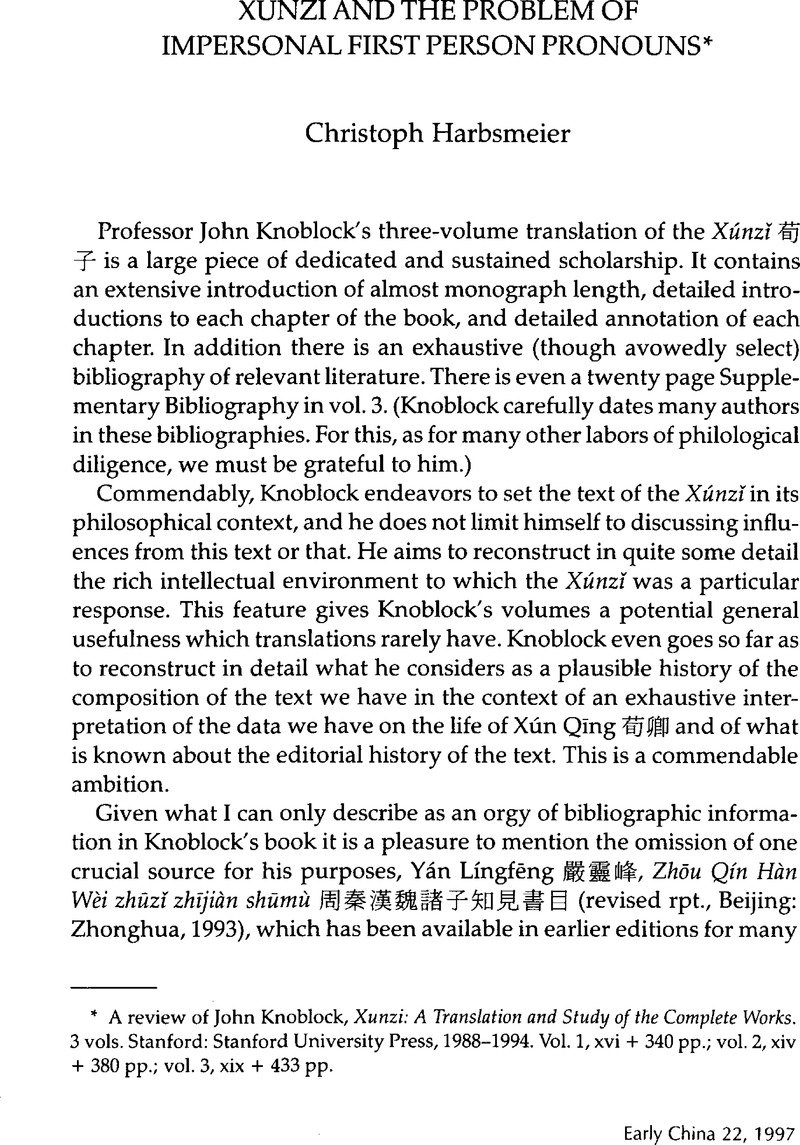Published online by Cambridge University Press: 26 March 2015

A review of John Knoblock, Xunzi: A Translation and Study of the Complete Works. 3 vols. Stanford: Stanford University Press, 1988–1994. Vol. 1, xvi + 340 pp.; vol. 2, xiv + 380 pp.; vol. 3, xix + 433 pp.
1. Notably Gassmann, Robert H., “Eine kontextorientierte Interpretation der Pronomina wu und wo im Meng-tzu,” Asiatische Studien 38.2 (1984), 129–53Google Scholar, which surveys earlier literature and tries to explain wǒ 我 in subject position as a high-status pronoun versus wú 吾 as a low-status first person pronoun. I shall try to show elsewhere that the distinction is in fact more like that between subjective, personal (and often informal) wú 吾 “I, we all of us, (talking to one' s own group:) our group” versus an objective, contrastive (and often collective) wǒ 我 “I for my part, (talking to outsiders to one's own party:) our party” in subject position—an idea that has long been around in classrooms where classical Chinese is sensitively read, but which I have never seen cogently demonstrated with a sound and sufficiently large set of illuminating examples to be helpful and right. For the Mencius and the Analects, I believe that a good case can be made for distinctions along these lines. For the Zuǒzhuàn 左傳 I believe I have demonstrated the tightness of the distinctions in exhaustive detail. How this works for texts like the Xúnzǐ remains a widely open question which I have not gone into in the necessary obsessive detail. I note that there is no trace whatsoever of impersonal wǒ 我 or wú 吾 in Zuǒzhuàn. It would appear that it is a philosophical derived usage.
2. The entry on wú 吾 in Hànyǔ dàzìdiǎn 漢雲吾大字典 (Chengdu: Sichuancishu, 1988), vol. 1, 586Google Scholar, is disarmingly brief: “First person pronoun, I.” No other relevant semantic explanations are given. Important teaching handbooks like Hóng Chéngyù 洪成玉, Gǔdàihànyǔ jiàochéng 古代漢語敎程 (Beijing: Zhonghua, 1995), 393Google Scholar, and Xíliáng, Guō 郭鍚良 et al., Gǔdài Hànyǔ 古代漢語 (Tianjin: Tianjinjiaoyu, 1994), 318Google Scholar, add nothing to the picture; and Gǔ Hànyǔ chángyòngzì zìdiǎn 古漢語常用字字典 (Beijing: Shangwu, 1979), 256Google Scholar, defines disappointingly: “我(門), 我(門)的.”
3. Hànyǔ dàzidiǎn, vol. 2, 1401Google Scholar, overlooks this usage and defines wǒ 我 as follows:
a. I, we.
b. our party (ZUO, Duke Zhuang 10.1, 齊師伐我).
c. intimate: myr our (LUNYU 7.1, 我老彭).
d. be opinionated (LUNYU 9.4, 毋固, 毋我).
The dictionary gives three other meanings attributed to the word which are of no concern to us here.
Fǎgāo's, ZhōuZhōngguó gǔdài yǔfǎ 中國古代語法 (Taipei: Academia Sinica, 1959–1962)Google Scholar does not notice this phenomenon. Neither does the excellent concise grammar by a, Drevnekitajskij jazyk (Moscow: Nauka, 1965), 66–69Google Scholar, nor, for example, Mèngchǔn's, Yì 易孟醇, Xiān Qín yǔfǎ 先秦言吾法 (Changsha: Hunanjiaoyu, 1989), 123–34Google Scholar.
4. Note that jǐ ![]() refers to a general “one” here, a reference this word can only have when there is no overt subject present to which it could refer specifically.
refers to a general “one” here, a reference this word can only have when there is no overt subject present to which it could refer specifically.
5. I am sorry to say that, perhaps through a printer's error, these wonderful lines are sadly misspelt in the Greek: the capitalization of psuchē as well as of phila is not only wrong but quite irritating. Moreover, the current word is emprakton “the practicable, das Mögliche,” not hemprakion.
6. Read aoidais for Knoblock's aoidiis.